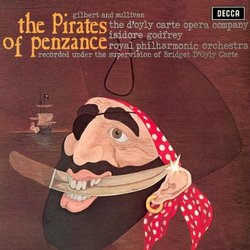| All Artists: Arthur Sullivan, Isidore Godfrey, Royal Philharmonic Orchestra, Christene Palmer, Donald Adams, George Cook, Jean Allister, John Reed, Owen Brannigan, Pauline Wales, Philip Potter, Susan Maisey, Valerie Masterson Title: Gilbert & Sullivan: The Pirates of Penzance Members Wishing: 0 Total Copies: 0 Label: Decca Release Date: 5/13/2003 Album Type: Original recording reissued Genre: Classical Style: Opera & Classical Vocal Number of Discs: 2 SwapaCD Credits: 2 UPC: 028947365020 |
Search - Arthur Sullivan, Isidore Godfrey, Royal Philharmonic Orchestra :: Gilbert & Sullivan: The Pirates of Penzance
 | Arthur Sullivan, Isidore Godfrey, Royal Philharmonic Orchestra Gilbert & Sullivan: The Pirates of Penzance Genre: Classical
|
Larger Image |
CD Details |
CD ReviewsThe Best of Many, Many Recordings Carte1964 | Hartford, CT United States | 03/11/2004 (5 out of 5 stars) "The cast is first-rate. John Reed is in very good form. Owen Brannigan (replacing the usual George Cook) is for me the greatest Sergeant. Brannigan, also found on many of Benjamin Britten's opera recordings, has the bass voice the role requires (I do not feel it should be sung by baritones) and his dialogue remains the standard. I've always enjoyed Donald Adams and his Pirate is also the standard. Potter, Masterson and Palmer are very good. The ensemble and orchestra conducted by Godfrey create a very exciting, sparkling performance. This is the recording I grew up with and no other has beaten it yet.All dialogue is included. No updates or major cuts." Quality but Staid Theseus | US of A | 05/29/2005 (3 out of 5 stars) "For newbies: *Pirates* is indeed one of the most pleasurable of the G&S shows. While not the most satirical, not the most ambitious, it is perhaps the most perfectly realized. Particular treat: wonderful music and lyrics for the chorus. For newbies: the D-Carte Company produced the premieres of the G&S operettas with Gilbert and Sullivan. Until some point well into the 20th c (1980's?) the company performed and recorded the repertory. Thus, there is a rare historical cachet to anything D-Carte. The Good on this recording: a sly, sonorous, and expressive Police Sgt; sensitive duet singing by Frederick and Mabel; anchoring tempi; a strong chorus. The Bad on this recording: J. Reed as Major-General is really hard for me to listen to...his instrument is dreadful AND he manages to not be amusing. On the whole I think sounds as if the cast has been performing this show for decades. There is dignity here, but little light or life. I'm not looking for some tarted-up reimagining, but it all strikes me as stodgy." Solid and Traditional SuperSchtroumpf | Lyon, France | 05/19/2005 (4 out of 5 stars) "Despite its old production date, the music is loud and clear - no static, scratching, distortion, etc. that you can get some from old productions.
This production is a solid, regular performance. Excellent voices, English accents, original (as far as I know) dialogue, etc. No surprises at all. I haven't heard the other versions that are available; but this one sets the standard." |

 Track Listings (15) - Disc #1
Track Listings (15) - Disc #1